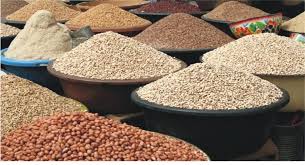Analysts anticipate that Nigeria, with a population exceeding 200 million, could escalate its food exports beyond current levels. Given its substantial population and considerable agricultural capacity, it’s conceivable that the country could augment its food exports. As of January 2022, Nigeria’s annual exports amounted to less than $100 billion. Nevertheless, there is considerable potential for diversifying Nigeria’s export portfolio to encompass more agricultural products.
Considering Nigeria’s agricultural potential and the global demand for diverse food products, there exists ample opportunity for expansion within the agricultural export sector. Nigeria has notably served as a significant exporter of various agricultural commodities, such as cocoa, cashew, sesame, soybeans, and cut flowers. These goods have played pivotal roles in the economy, bolstering export revenues and providing livelihoods for numerous individuals engaged in the sector. Nevertheless, akin to many developing nations, Nigeria encounters challenges within its agricultural sphere, affecting its capacity to fully capitalize on the potential of these pivotal export items.
Despite these hurdles, which are not unique, Dr. Vincent Isegbe, the Director-General of the Nigeria Agricultural Quarantine Service (NAQS), maintains an optimistic outlook regarding Nigeria’s prospects for growth and productivity. Despite economic challenges, particularly prevalent in the more economically prosperous African nations, Dr. Isegbe believes that Nigeria possesses the human capital necessary to propel growth, revolutionize its value chains, and elevate productivity across various sectors. Such optimism likely stems from Nigeria’s sizable population, abundant natural resources, and the resilience exhibited by its populace in the face of adversity.
Isegbe’s perspective underscores the significance of harnessing human resources and fostering innovation to surmount economic challenges and propel Nigeria towards sustainable development. His confidence in Nigeria’s capacity to drive growth, reshape its value chains, and enhance productivity reflects an optimistic view of the country’s capabilities and resources. With Nigeria being one of Africa’s most populous nations, boasting a diverse array of industries and a burgeoning entrepreneurial ethos, it undoubtedly possesses a rich pool of human capital and talent ripe for economic advancement.
The future appears promising for him, buoyed by the Federal Government’s dedication to expanding the nation’s export spectrum and cultivating stronger trade ties. His assertion, “I’ll tell you straight away that the state of the Nigerian agricultural economy is very, very bright…” reflects a sense of optimism grounded in tangible assets. With vast arable land covering 34 million square meters, abundant water resources for irrigation, and a sizable population exceeding 230 million, Nigeria holds the dual advantage of being situated in the equatorial ecological zone, enabling year-round agricultural production and the ability to engage in dry-season farming to supplement rainy-season yields.
Furthermore, Nigeria’s ample water bodies, including rivers and streams, offer opportunities for dry-season agriculture. Moreover, Nigeria’s agricultural economy isn’t solely reliant on rain-fed agriculture, amplifying its potential for growth and export. Leveraging these advantages cohesively could see Nigeria meet domestic demands and bolster its export capacity significantly.
As one of Africa’s leading economies, Nigeria stands poised for further economic development. Embracing the concept of comparative advantage, which advocates for specialization in sectors where the opportunity cost is lower, can bolster Nigeria’s economic efficiency and global competitiveness.
The head of NAQS underscored the significance of such strategic deliberations in reshaping trade dynamics. By harmonizing trade policies and practices with Nigeria’s comparative advantages, he believed the government could facilitate export expansion, attract foreign investment, and fortify domestic industries. He stressed the imperative for both the government and the private sector to complement these strategic considerations with substantial infrastructure development. According to him, this step is pivotal for unlocking Nigeria’s full comparative advantage potential and nurturing sustainable economic growth and prosperity. He viewed the increasing efforts by local and international business leaders to enhance capacities for exporting foodstuffs and agricultural products as profoundly impactful.
In general, he holds the belief that investing in building capacities for agricultural exports can yield substantial and extensive impacts on the economy.
With his extensive experience as a prominent figure in the industry, Isegbe perceives the agri-food sector as embarking on a sustainable trajectory, with Nigeria well-placed to capitalize on emerging global prospects.
Isegbe’s positive outlook regarding Nigeria’s prospects in the agri-food industry mirrors an acknowledgment of the nation’s strengths and opportunities, alongside a dedication to fostering sustainable growth and advancement within the sector.
The Director-General holds an optimistic view regarding Nigeria’s export potential, particularly within the agricultural trade domain. He perceives the global export arena as expansive and continually growing, offering businesses ample opportunities for expansion and progress. Additionally, he recognizes the strategic significance of Nigeria’s agricultural trade, with agricultural commodities playing a pivotal role in this context. With the government unveiling ambitious plans to bolster sustainable food production for export, the Director-General believes that this endeavor will not only strengthen the economy but also address global food supply shortages. This perspective underscores an acknowledgment of the substantial impact Nigeria’s agricultural exports can wield, both domestically in terms of prosperity and internationally concerning food security.
However, the agricultural sector faces multifaceted challenges, despite Nigeria’s aspirations to emerge as a significant player in agro-processing, manufacturing, and assembly. Escalating input costs, encompassing seeds, fertilizers, pesticides, and machinery, pose a persistent obstacle, rendering farming increasingly expensive and squeezing farmers’ profitability. This, in turn, impedes investment in modern agricultural techniques. The compounding effects of soaring input costs and adverse weather conditions present formidable hurdles for the industry and primary producers alike.
The Director-General highlighted, “If you begin to number them, we have identified about 30 prominent challenges in agriculture.” Among these, he cited deficiencies in research and development, particularly in the realm of standardized seedlings. There’s a pressing need to establish a robust seed base and a secure gene bank to safeguard these resources for future generations. While these assets exist, there’s a critical imperative for streamlined coordination and enhanced efficiency in their management and improvement.
As the frontier of technology advances, he maintains that Nigeria will progress alongside it. He suggests that the private sector should collaborate with the government not only to expedite scientific advancements but also to foster the development of high-quality talent. This viewpoint echoes a common understanding that partnerships between the private sector and the government can significantly accelerate scientific advancements and enhance talent development within the agricultural sector.
With the United Nations projecting that the global population will reach 9.7 billion by 2050—an increase of 1.7 billion from 2022—he expresses concern that the current production system may not adequately provide food for future generations. While recognizing the challenge of global food security amidst population growth, he believes in the potential of agritech and food innovation to address these issues. He highlights advancements in digitalization within agriculture, involving technologies such as sensors, drones, GPS, data analytics, and machine learning to optimize various farming practices.
These technologies empower farmers to make data-driven decisions on crop management, irrigation, fertilization, pest control, and harvest timing, ultimately maximizing yields while minimizing resource use and environmental impact. However, he expresses concern about the low adoption and integration of agritech solutions, which poses significant challenges to food production.
He notes that despite the country’s aspirations to become a major player in agro-processing, manufacturing, and assembly, challenges persist, such as rising input costs and reliance on traditional farming tools. He emphasizes the need for Nigeria to transition to modern agricultural practices, leveraging advanced technologies like tractors, precision agriculture, and AI-driven equipment. This shift, he believes, will enhance efficiency and productivity in farming.
While acknowledging the government’s efforts to transform the agricultural sector, he stresses the importance of increased investment in safety, particularly in pesticide education, to support productivity growth. He underscores the need for regulations to control the sale and management of agrochemicals, ensuring their safe and appropriate usage by farmers.
Moreover, he calls for enhanced collaboration between the government and the private sector to upgrade the agricultural value chain, focusing on critical components like storage and transportation infrastructure. Improving storage facilities and transportation networks can enhance competitiveness, increase export potential, and promote economic development within the agricultural sector.
As the government continues its efforts to transform agriculture for a sustainable and food-secure future, he reaffirms NAQS’s commitment to supporting producers in generating income from exports. NAQS plays a crucial role in farm inspection and certification to ensure adherence to quality standards and regulations, thereby facilitating smooth exports and safeguarding food security.





